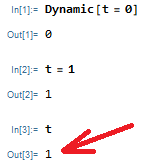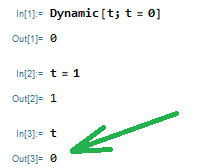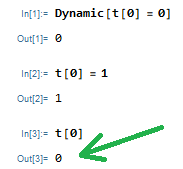Consider the 3 following manually entered evaluations where a Set statement is brought to the Front-End by Dynamic:
Obviously the Set statement in Dynamic is evaluated only once, at the beginning. Despite remaining on the screen at all times and despite manual future alteration of t, t=0 does not seem to be evaluated again. According to documentation I would expect the Set statement to be evaluated each time t changes.
Why is this so? I failed to see the explanation in the neat answers Using Refresh[..] with TrackedSymbols! and advanced Dynamic documentation.
This is further surprising, considering that adding t; in the Dynamic expression, recovers systematic evaluation of t=0 when t is altered:
Later increment: following the suggestion by Kuba in the comments about using t[], here is a third case where t[0] apparently does not depend on t (like the first case) but actually updates this time.
Thank you for you help and keep on the good work.




t = 0does not depend on the value oft. The statementt; t = 0does, sincetis evaluated. $\endgroup$tformally (lexically) appears in the expression to be updated byDynamic. I better understand the logics now, somehow clearer than the multipage documentation, thank you. $\endgroup$